Management
VerifiedAdded on 2023/04/22
|5
|1143
|428
AI Summary
This document discusses two ethical dilemmas faced by employees in the logistics and parcel transport business. The first scenario involves lying to customers about the delivery of their parcels, while the second scenario involves covering up damages to a customer's luggage. The document provides insights on how to handle such situations with honesty and transparency. It also includes references to relevant literature on business ethics. The document is suitable for students studying management, logistics, and business ethics.
Contribute Materials
Your contribution can guide someone’s learning journey. Share your
documents today.
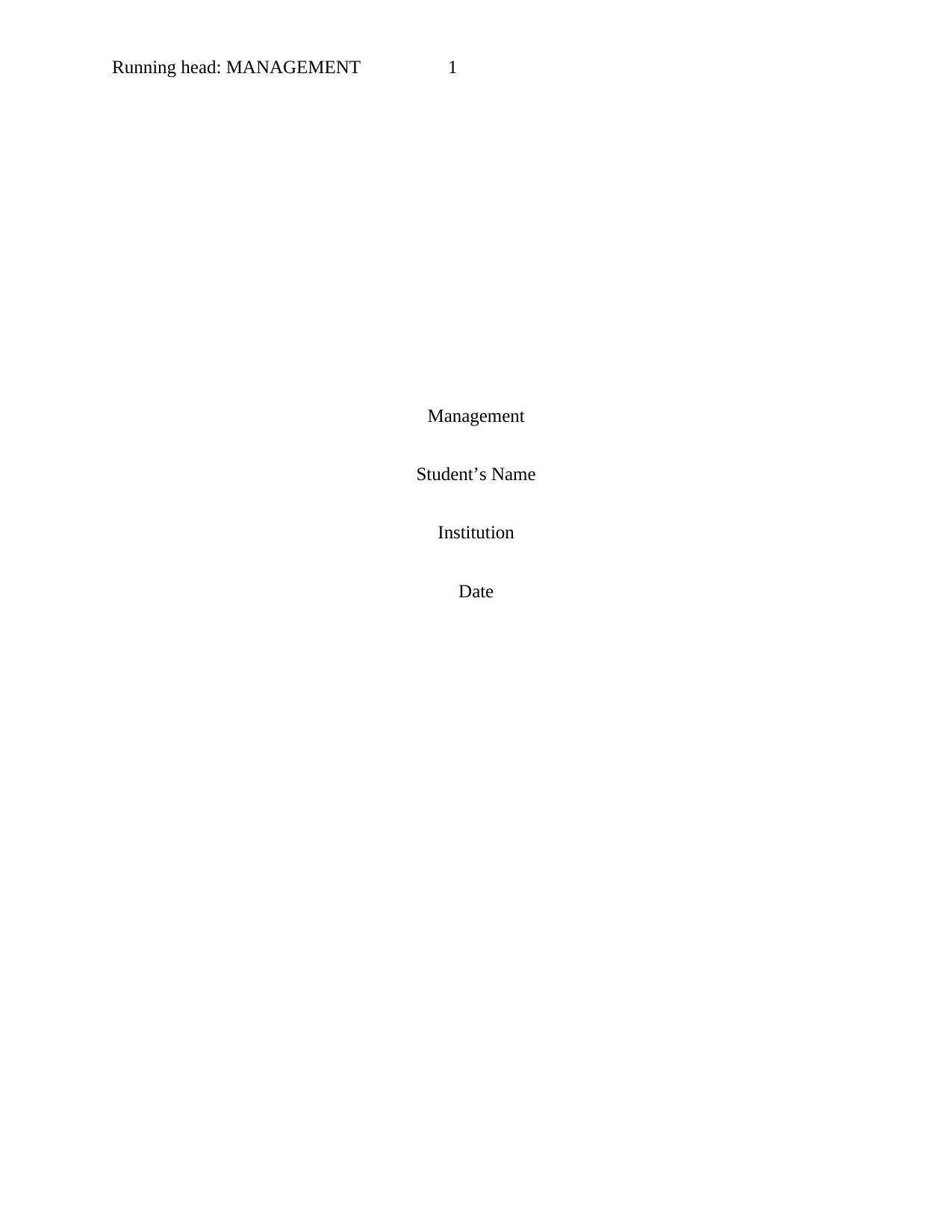
Running head: MANAGEMENT 1
Management
Student’s Name
Institution
Date
Management
Student’s Name
Institution
Date
Secure Best Marks with AI Grader
Need help grading? Try our AI Grader for instant feedback on your assignments.
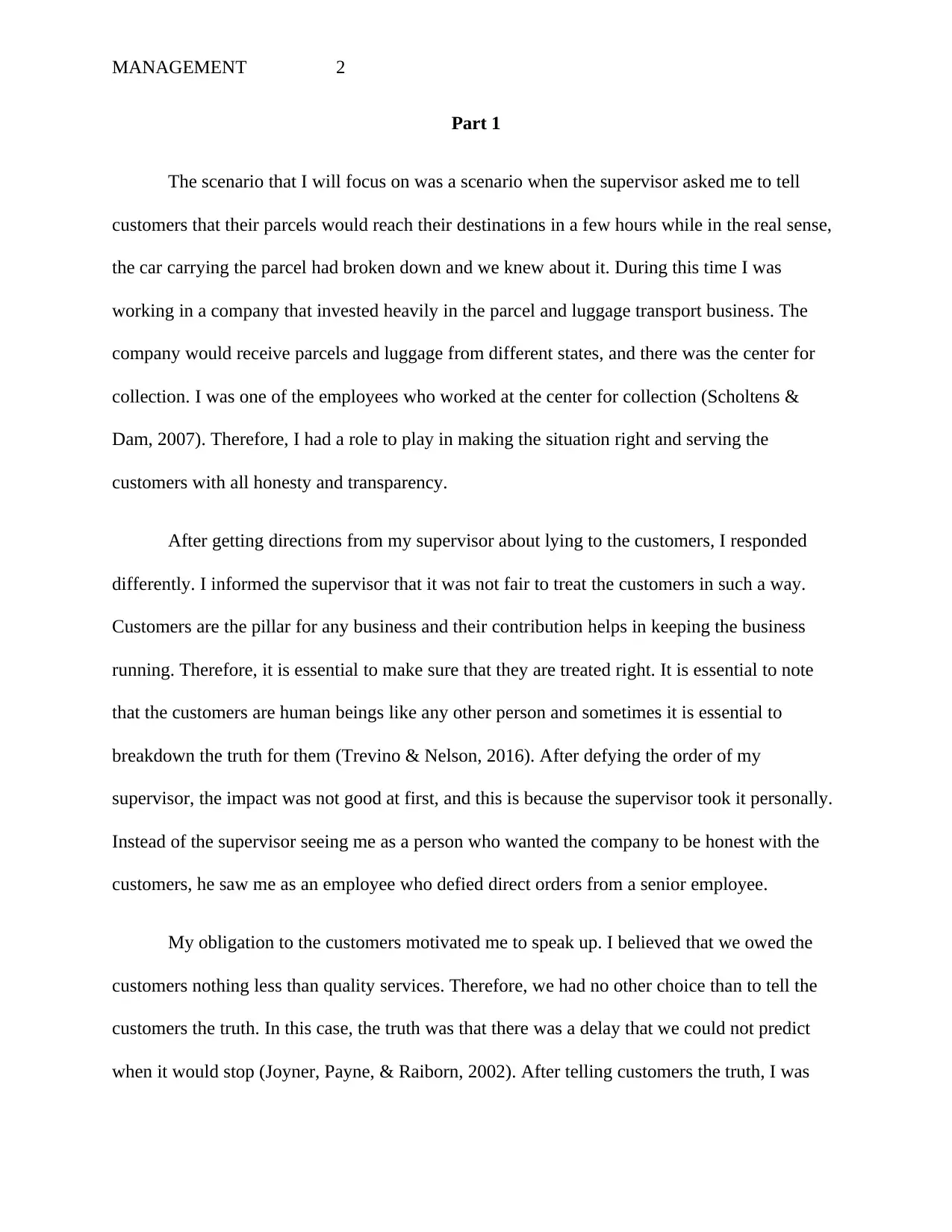
MANAGEMENT 2
Part 1
The scenario that I will focus on was a scenario when the supervisor asked me to tell
customers that their parcels would reach their destinations in a few hours while in the real sense,
the car carrying the parcel had broken down and we knew about it. During this time I was
working in a company that invested heavily in the parcel and luggage transport business. The
company would receive parcels and luggage from different states, and there was the center for
collection. I was one of the employees who worked at the center for collection (Scholtens &
Dam, 2007). Therefore, I had a role to play in making the situation right and serving the
customers with all honesty and transparency.
After getting directions from my supervisor about lying to the customers, I responded
differently. I informed the supervisor that it was not fair to treat the customers in such a way.
Customers are the pillar for any business and their contribution helps in keeping the business
running. Therefore, it is essential to make sure that they are treated right. It is essential to note
that the customers are human beings like any other person and sometimes it is essential to
breakdown the truth for them (Trevino & Nelson, 2016). After defying the order of my
supervisor, the impact was not good at first, and this is because the supervisor took it personally.
Instead of the supervisor seeing me as a person who wanted the company to be honest with the
customers, he saw me as an employee who defied direct orders from a senior employee.
My obligation to the customers motivated me to speak up. I believed that we owed the
customers nothing less than quality services. Therefore, we had no other choice than to tell the
customers the truth. In this case, the truth was that there was a delay that we could not predict
when it would stop (Joyner, Payne, & Raiborn, 2002). After telling customers the truth, I was
Part 1
The scenario that I will focus on was a scenario when the supervisor asked me to tell
customers that their parcels would reach their destinations in a few hours while in the real sense,
the car carrying the parcel had broken down and we knew about it. During this time I was
working in a company that invested heavily in the parcel and luggage transport business. The
company would receive parcels and luggage from different states, and there was the center for
collection. I was one of the employees who worked at the center for collection (Scholtens &
Dam, 2007). Therefore, I had a role to play in making the situation right and serving the
customers with all honesty and transparency.
After getting directions from my supervisor about lying to the customers, I responded
differently. I informed the supervisor that it was not fair to treat the customers in such a way.
Customers are the pillar for any business and their contribution helps in keeping the business
running. Therefore, it is essential to make sure that they are treated right. It is essential to note
that the customers are human beings like any other person and sometimes it is essential to
breakdown the truth for them (Trevino & Nelson, 2016). After defying the order of my
supervisor, the impact was not good at first, and this is because the supervisor took it personally.
Instead of the supervisor seeing me as a person who wanted the company to be honest with the
customers, he saw me as an employee who defied direct orders from a senior employee.
My obligation to the customers motivated me to speak up. I believed that we owed the
customers nothing less than quality services. Therefore, we had no other choice than to tell the
customers the truth. In this case, the truth was that there was a delay that we could not predict
when it would stop (Joyner, Payne, & Raiborn, 2002). After telling customers the truth, I was
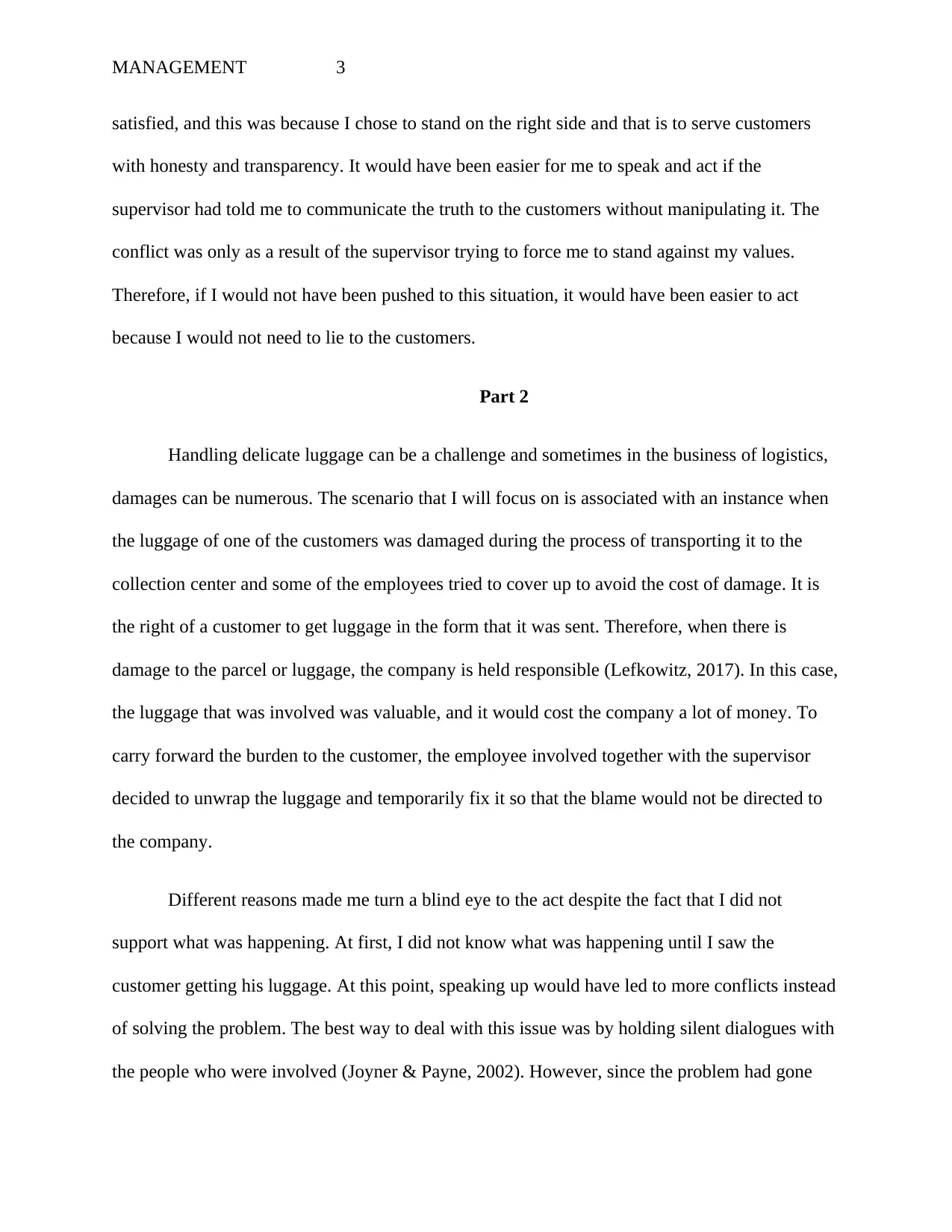
MANAGEMENT 3
satisfied, and this was because I chose to stand on the right side and that is to serve customers
with honesty and transparency. It would have been easier for me to speak and act if the
supervisor had told me to communicate the truth to the customers without manipulating it. The
conflict was only as a result of the supervisor trying to force me to stand against my values.
Therefore, if I would not have been pushed to this situation, it would have been easier to act
because I would not need to lie to the customers.
Part 2
Handling delicate luggage can be a challenge and sometimes in the business of logistics,
damages can be numerous. The scenario that I will focus on is associated with an instance when
the luggage of one of the customers was damaged during the process of transporting it to the
collection center and some of the employees tried to cover up to avoid the cost of damage. It is
the right of a customer to get luggage in the form that it was sent. Therefore, when there is
damage to the parcel or luggage, the company is held responsible (Lefkowitz, 2017). In this case,
the luggage that was involved was valuable, and it would cost the company a lot of money. To
carry forward the burden to the customer, the employee involved together with the supervisor
decided to unwrap the luggage and temporarily fix it so that the blame would not be directed to
the company.
Different reasons made me turn a blind eye to the act despite the fact that I did not
support what was happening. At first, I did not know what was happening until I saw the
customer getting his luggage. At this point, speaking up would have led to more conflicts instead
of solving the problem. The best way to deal with this issue was by holding silent dialogues with
the people who were involved (Joyner & Payne, 2002). However, since the problem had gone
satisfied, and this was because I chose to stand on the right side and that is to serve customers
with honesty and transparency. It would have been easier for me to speak and act if the
supervisor had told me to communicate the truth to the customers without manipulating it. The
conflict was only as a result of the supervisor trying to force me to stand against my values.
Therefore, if I would not have been pushed to this situation, it would have been easier to act
because I would not need to lie to the customers.
Part 2
Handling delicate luggage can be a challenge and sometimes in the business of logistics,
damages can be numerous. The scenario that I will focus on is associated with an instance when
the luggage of one of the customers was damaged during the process of transporting it to the
collection center and some of the employees tried to cover up to avoid the cost of damage. It is
the right of a customer to get luggage in the form that it was sent. Therefore, when there is
damage to the parcel or luggage, the company is held responsible (Lefkowitz, 2017). In this case,
the luggage that was involved was valuable, and it would cost the company a lot of money. To
carry forward the burden to the customer, the employee involved together with the supervisor
decided to unwrap the luggage and temporarily fix it so that the blame would not be directed to
the company.
Different reasons made me turn a blind eye to the act despite the fact that I did not
support what was happening. At first, I did not know what was happening until I saw the
customer getting his luggage. At this point, speaking up would have led to more conflicts instead
of solving the problem. The best way to deal with this issue was by holding silent dialogues with
the people who were involved (Joyner & Payne, 2002). However, since the problem had gone
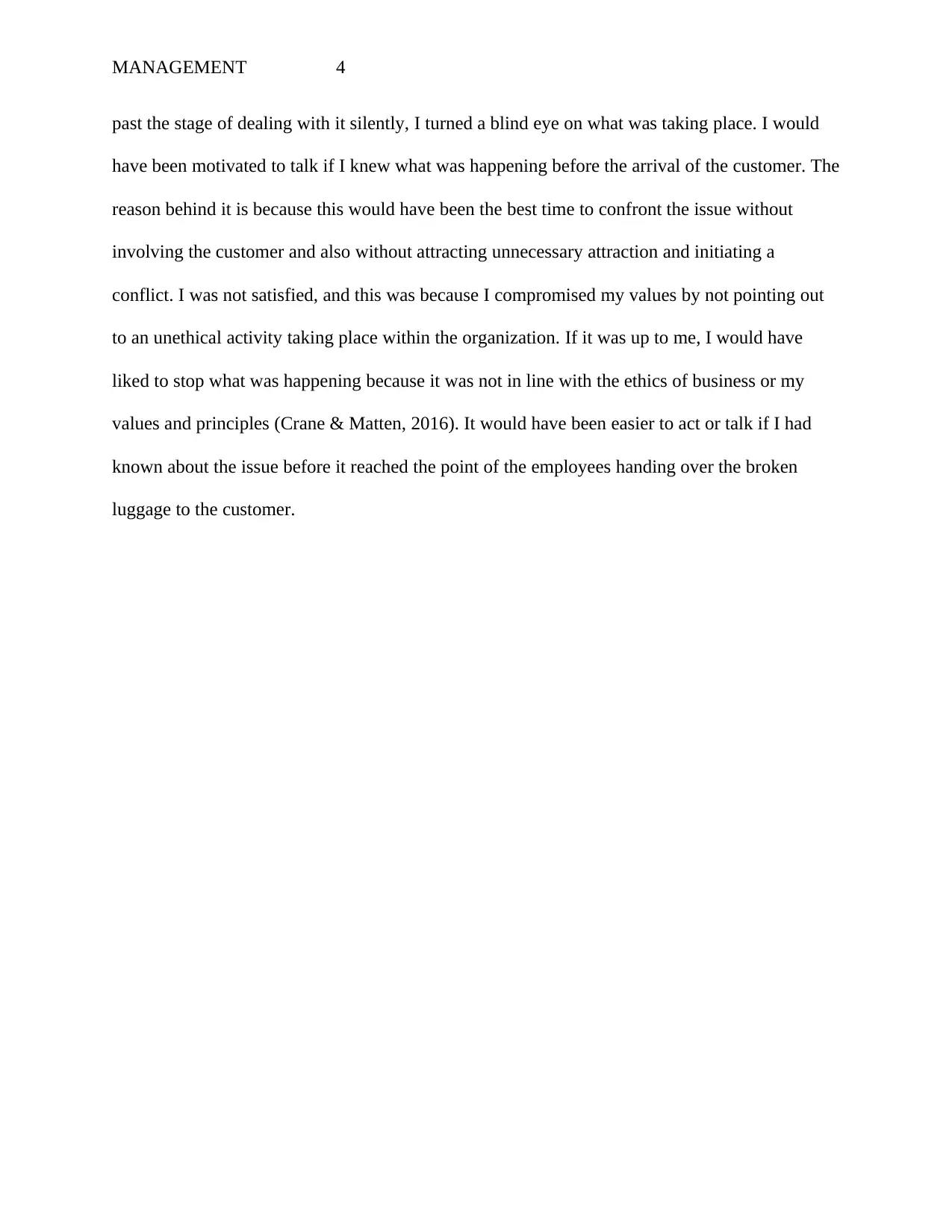
MANAGEMENT 4
past the stage of dealing with it silently, I turned a blind eye on what was taking place. I would
have been motivated to talk if I knew what was happening before the arrival of the customer. The
reason behind it is because this would have been the best time to confront the issue without
involving the customer and also without attracting unnecessary attraction and initiating a
conflict. I was not satisfied, and this was because I compromised my values by not pointing out
to an unethical activity taking place within the organization. If it was up to me, I would have
liked to stop what was happening because it was not in line with the ethics of business or my
values and principles (Crane & Matten, 2016). It would have been easier to act or talk if I had
known about the issue before it reached the point of the employees handing over the broken
luggage to the customer.
past the stage of dealing with it silently, I turned a blind eye on what was taking place. I would
have been motivated to talk if I knew what was happening before the arrival of the customer. The
reason behind it is because this would have been the best time to confront the issue without
involving the customer and also without attracting unnecessary attraction and initiating a
conflict. I was not satisfied, and this was because I compromised my values by not pointing out
to an unethical activity taking place within the organization. If it was up to me, I would have
liked to stop what was happening because it was not in line with the ethics of business or my
values and principles (Crane & Matten, 2016). It would have been easier to act or talk if I had
known about the issue before it reached the point of the employees handing over the broken
luggage to the customer.
Secure Best Marks with AI Grader
Need help grading? Try our AI Grader for instant feedback on your assignments.
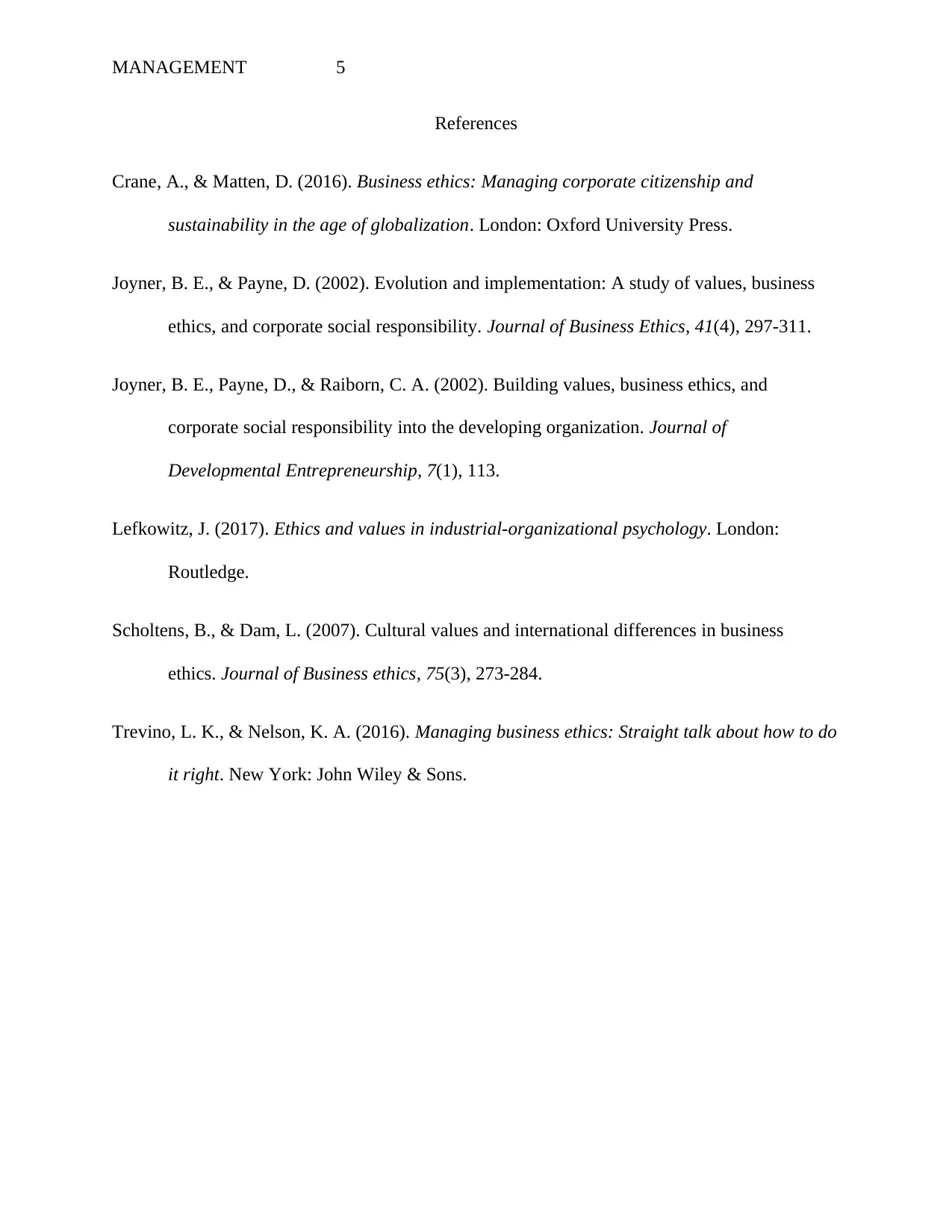
MANAGEMENT 5
References
Crane, A., & Matten, D. (2016). Business ethics: Managing corporate citizenship and
sustainability in the age of globalization. London: Oxford University Press.
Joyner, B. E., & Payne, D. (2002). Evolution and implementation: A study of values, business
ethics, and corporate social responsibility. Journal of Business Ethics, 41(4), 297-311.
Joyner, B. E., Payne, D., & Raiborn, C. A. (2002). Building values, business ethics, and
corporate social responsibility into the developing organization. Journal of
Developmental Entrepreneurship, 7(1), 113.
Lefkowitz, J. (2017). Ethics and values in industrial-organizational psychology. London:
Routledge.
Scholtens, B., & Dam, L. (2007). Cultural values and international differences in business
ethics. Journal of Business ethics, 75(3), 273-284.
Trevino, L. K., & Nelson, K. A. (2016). Managing business ethics: Straight talk about how to do
it right. New York: John Wiley & Sons.
References
Crane, A., & Matten, D. (2016). Business ethics: Managing corporate citizenship and
sustainability in the age of globalization. London: Oxford University Press.
Joyner, B. E., & Payne, D. (2002). Evolution and implementation: A study of values, business
ethics, and corporate social responsibility. Journal of Business Ethics, 41(4), 297-311.
Joyner, B. E., Payne, D., & Raiborn, C. A. (2002). Building values, business ethics, and
corporate social responsibility into the developing organization. Journal of
Developmental Entrepreneurship, 7(1), 113.
Lefkowitz, J. (2017). Ethics and values in industrial-organizational psychology. London:
Routledge.
Scholtens, B., & Dam, L. (2007). Cultural values and international differences in business
ethics. Journal of Business ethics, 75(3), 273-284.
Trevino, L. K., & Nelson, K. A. (2016). Managing business ethics: Straight talk about how to do
it right. New York: John Wiley & Sons.
1 out of 5
Your All-in-One AI-Powered Toolkit for Academic Success.
+13062052269
info@desklib.com
Available 24*7 on WhatsApp / Email
![[object Object]](/_next/static/media/star-bottom.7253800d.svg)
Unlock your academic potential
© 2024 | Zucol Services PVT LTD | All rights reserved.
